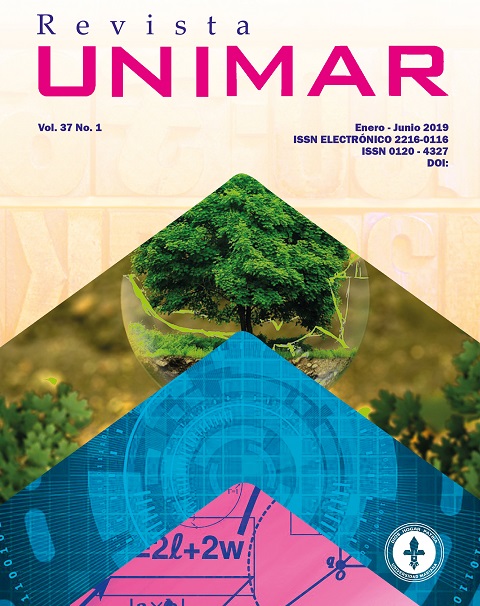Comparative analysis between Gender and Score of Saber Test in students of 11th Grade
DOI:
https://doi.org/10.31948/Rev.unimar/unimar37-1-art5Keywords:
Comparative evaluation, comparative research, quantitative analysis, causal analysisAbstract
A research study was carried out related to the scores obtained by the eleventh grade students of the General Santander Educational Institution of the Soacha, Cundinamarca municipality, comparing the results obtained in the morning and afternoon sessions. From the statistical analysis of the data applying the ANOVA, it was observed that the p-value of the test is equal to 0.622 for Critical reading, 0.062 for Mathematics, 0.625 for Social sciences, 0.513 for Natural sciences and 0.930 for English. Because these values are higher than α = 0.05, hypothesis Ha is rejected, which means that there are no significant differences between the averages for the variable Male and female gender in the morning and afternoon sessions. In turn, the results showed that the highest scores in each of the tests were better for men than for women.
Author Biography
Jorge Enrique Díaz-Pinzón, I.E. General Santander, Soacha, Cundinamarca, Colombia
Magíster en Gestión de la Tecnología Educativa. Especialista en Administración de la Informática Educativa. Ingeniero Agrónomo. Docente titular de Matemáticas e Investigador de la I.E. General Santander, Soacha, Cundinamarca, Colombia.
References
Ayala-García, J. (2015). Evaluación externa y calidad de la educación en Colombia. Documentos de trabajo sobre Economía Regional, 217. Bogotá, Colombia: Banco de la República.
Chica, S., Galvis, D. y Ramírez, A. (2009). Determinantes del rendimiento académico en Colombia. Pruebas ICFES - Saber 11, 2009. Revista Universidad EAFIT, 46(160), 48-72.
Díaz, J. (2016a). Aplicación PhET: estrategia de enseñanza-aprendizaje de fracciones equivalentes. Revista Criterios, 23(1), 111-123.
Díaz, J. (2016b). Soporte técnico de simulación Phet en la enseñanza y aprendizaje de fracciones equivalentes. Revista de Investigaciones Universidad del Quindío, 28(2), 31-41.
Díaz, J. (2017a). Importancia de la simulación Phet en la enseñanza y aprendizaje de fracciones equivalentes. Revista Educación y Desarrollo Social, 11(1), 11-43.
Díaz, J. (2017b). Simulador Applet Descartes: Como didáctica de enseñanza de la función cuadrática. Revista Innova Research Journal, 2(8), 69-78.
Díaz, J. (2017c). Conocimiento y apropiación de las tecnologías de la información y la comunicación (TIC) en la formación docente. Revista Actualidades Pedagógicas, 69, 121-131.
Díaz, J. (2017d). Formación de docentes en el uso y apropiación de las TIC. Revista Innova Research Journal, 2(9), 18-25. https://doi.org/10.31948/unimar36-2.art2
Díaz, J. (2018). Comparación entre las jornadas de los estudiantes y el puntaje obtenido en la Prueba Saber 11-2017 en la Institución Educativa General Santander. Revista UNIMAR, 36(2), 31-38. DOI: https://doi.org/10.31948/unimar36-2.art2
Instituto Colombiano para el Fomento de la Educación Superior (ICFES). (2013). Alineación examen Saber 11°. Recuperado de https://www.icfes.gov.co/documents/20143/193784/Alineacion%20examen%20Saber%2011.pdf
Ministerio de Educación Nacional (MEN). (1980). Decreto 2343 de Septiembre 4 de 1980 “por el cual se reglamenta los exámenes de Estado para el ingreso a la educación superior”. Recuperado de https://www.mineducacion.gov.co/1621/article-103244.html
Ministerio de Educación Nacional (MEN). (2010). Decreto 869 de 2010 “por el cual se reglamenta el Examen de Estado de la Educación Media, ICFES – Saber 11°. Recuperado de https://www.mineducacion.gov.co/1621/articles-221588_archivo_pdf_decreto_869.pdf
Ministerio de Educación Nacional (MEN). (2012). Pruebas Saber. Recuperado de https://www.mineducacion.gov.co/1621/article-244735.html
Ministerio de Educación Nacional (MEN). (2013). Programa para la Trasformación de la Calidad Educativa. Recuperado de https://www.mineducacion.gov.co/1759/articles-326662_archivo_pdf_Dia2_PRESENTACION_SECRETARIOS_PTA.pdf
Reyes-Navarro, J. (2013). Efectos académicos de las Pruebas Saber 11º en las instituciones educativas del departamento de Córdoba: una perspectiva de gestión. Actualidades Pedagógicas (62), 109-126. https://doi.org/10.19052/ap.2274
Sánchez, L. y Muñoz, N. (2014). Prepárate divertidamente para las Pruebas Saber (Trabajo de Grado). Universidad Católica de Manizales. Recuperado de http://repositorio.ucm.edu.co:8080/jspui/bitstream/handle/10839/994/Nancy%20Liliana%20Munoz%20Betancurth.pdf?sequence=1&isAllowed=y
Shuttleworth, M. (2008). Diseño de la investigación cuantitativa. Recuperado de https://explorable.com/es/diseno-de-la-investigacion-cuantitativa
Universidad del Norte. (2015). Propuesta de Evaluación con Carácter Diagnóstico Formativa – ECDF. Recuperado de http://aprende.colombiaaprende.edu.co/sites/all/modules/mapa/docs/curso_ECDF/UNINORTE_curso%20ECDF.pdf
How to Cite
Downloads
Downloads
Published
Issue
Section
License

This work is licensed under a Creative Commons Attribution 4.0 International License.
Los autores que publiquen en esta revista aceptan las siguientes condiciones:
1. Los autores conservan los derechos de autor y ceden a la revista el derecho de la primera publicación, con el trabajo registrado con la licencia de atribución de Creative Commons, que permite a terceros utilizar lo publicado siempre que mencionen la autoría del trabajo y a la primera publicación en esta revista.
2. Los autores pueden realizar otros acuerdos contractuales independientes y adicionales para la distribución no exclusiva de la versión del artículo publicado en esta revista (p. ej., incluirlo en un repositorio institucional o publicarlo en un libro) siempre que indiquen claramente que el trabajo se publicó por primera vez en esta revista.
3. Se permite y recomienda a los autores publicar su trabajo en Internet (por ejemplo en páginas institucionales o personales) antes y durante el proceso de revisión y publicación, ya que puede conducir a intercambios productivos y a una mayor y más rápida difusión del trabajo publicado (veaThe Effect of Open Access).
| Article metrics | |
|---|---|
| Abstract views | |
| Galley vies | |
| PDF Views | |
| HTML views | |
| Other views | |




